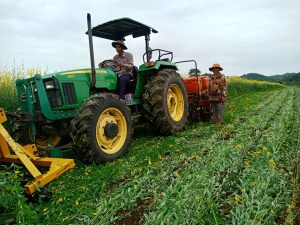Compte-rendu officiel des Concertations pour le Sommet des Nations Unies sur les systèmes alimentaires 2021
Type de Concertation
Étape
Coordonnateur
Langue de l'événement de Concertation
Date/heure
À:
Ville
Cible géographique
Format
Veuillez consulter les détails ci-dessous pour obtenir des renseignements sur l’inscription, s’ils sont disponibles, ou communiquer avec le coordonnateur si vous souhaitez y assister.
Animateur
Description
There is a need for the Cambodian agriculture sector to reinvent itself by shifting from increased production through land expansion towards sustainable intensification. As Cambodia finds new pathways to drive future growth, technology will play a critical role in transforming the sector. The Royal Government of Cambodia’s (RGC) vision to modernise Cambodia’s agriculture recognises that sustainable intensification primarily depends on the application of techniques, new technologies, R&D, mechanisation, and increased capacity of irrigation to improve productivity.
The transformation of Cambodian agriculture towards a future vision of sustainable intensification can be possible with new agriculture techniques and technology and for this purpose agricultural extension services are key. Hence, for Cambodia to shift from conventional practice toward a sustainable intensification practices, there is a need for extension service that will sensitize the farmers and help open the market for private sector companies to promote their products.
MetKasekor is an ‘’opening the market’’ early adopter led, extension model. The model will be piloted in a few provinces in Cambodia by the Ministry of Agriculture, Forestry and Fisheries, with support from The Center of Excellence on Sustainable Agricultural Intensification and Nutrition, Royal University of Agriculture (CESAIN/RUA), Centre de Coopération en Recherche Agronomique pour le Développement (CIRAD) in Cambodia, Innovation for Sustainable Agriculture (ISA), Swisscontact and Kansas State University. This event is organized to sensitize the different departments of the MAFF, the Provincial Departments of Agriculture, Forestry and Fisheries (PDAFFs), the private sector and other relevant stakeholders and to discuss the opportunities for transformation of agricultural extension services as part of a new era for digitalization.
Remerciements


